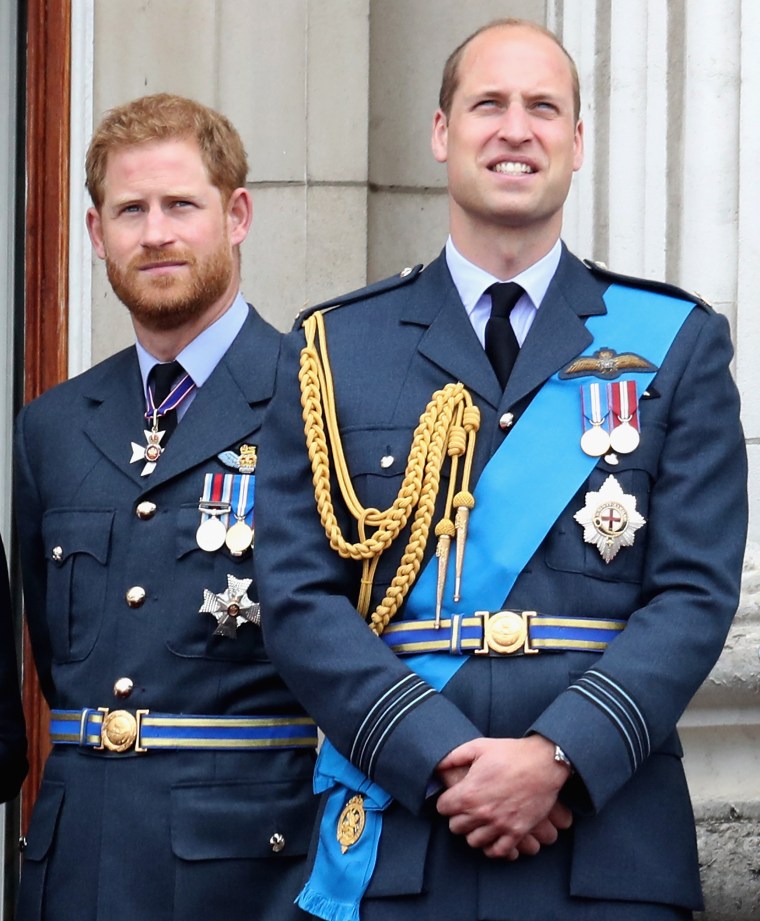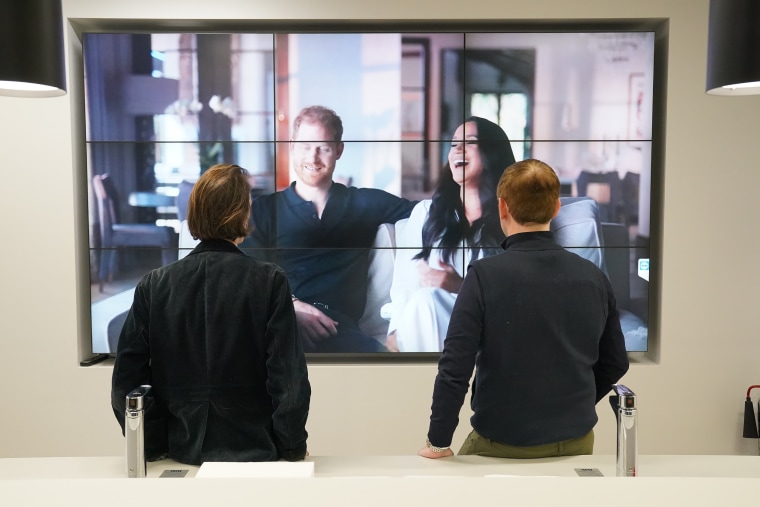I had no intention of watching the Netflix docuseries “Harry & Meghan,” the first three episodes of which dropped Dec. 8. Though the former royal couple had my sympathy, they didn’t deserve more of my attention. At least, that’s what I told myself.
My vow not to watch lasted until Dec. 10, when I was alone in the kitchen baking and cooking and starved for the distraction that can be provided only by two rich, attractive people bathed in ethereal light, answering softball questions lobbed by a mostly off-camera interviewer and accompanied by a soundtrack straight out of “Downton Abbey.”
I don’t want to think that I’ve been betting on the wrong team. I want to admire Harry and Meghan. But I’m done with watching their “poor me” act.
The fact is, I’ve always liked Meghan and Harry. I have been particularly impressed by Meg (apparently that’s what those closest to her call her, and after watching the Netflix episodes, not to mention the Oprah Winfrey interview and way too many YouTube clips, I feel that includes me). I love that she went to Northwestern, minored in English, made it as an actress and had a full and interesting life before she met Harry and they became the Duke and Duchess of Sussex.
This was someone, I found out around the time of the Oprah interview, who as a kid lobbied Procter & Gamble to change an ad campaign for dishwashing soap when she let the company know (quite rightly) that the ad was sexist. Soon after, it reworded the ad. The story lost none of its appeal in the Netflix series.
In her early activism, Meg reminded me of my sister, who wrote a letter to our state assemblyman in New York in 1972 complaining that the law forbidding girls to deliver newspapers was sexist. The state assembly changed the law. (Maybe if my sister had married a prince, this would be common knowledge, but she’s married to an arborist and neither Oprah nor Netflix has shown any interest in their relationship.)
But Meg doesn’t just remind me of my sister; she reminds me of myself. We were both raised by strong, single mothers who encouraged us to be self-sufficient and were also fiercely protective. Meg seems as close to her mom as I was to mine. Harry, of course, isn’t as relatable. But I have always had empathy for him because we both lost a parent in early adolescence, and our surviving parent insisted that we keep calm and carry on. When you’re not allowed to acknowledge and express your grief, you turn it inward. All the privilege in the world can’t shield you from that kind of pain.
So I’ve always been on Team Sussex. As the drama around the couple unfolded over the years, I found their gripes legitimate. I can understand Harry’s ongoing trauma with the unconstrained media. If my mother had died the way Princess Diana did, I’d have trouble watching packs of reporters going after my wife. There’s no question that British outlets, and many others, treated Meg terribly, and that the racism she encountered was appalling.
But watching the Netflix series, whose last three episodes were released on Thursday, made me realize I’ve reached peak Harry and Meg consumption, and the ongoing airing of their dirty laundry makes me feel icky (not that it stopped me from watching). I’m not sure if the point of “Harry & Meghan” was to make people feel sorry for them, but that’s certainly one of the messages I got, and I found it cringeworthy. It’s time for them to stop playing the victim card. I keep thinking of that Shakespeare line, “The lady doth protest too much, methinks.” The context is different but the point is the same: Enough already.
Yes, they were treated really badly. But if anyone has the resources to pull themselves up and do something positive to overcome that, it’s the two of them. Maybe they think their Netflix series is that something. I disagree — and I’m not alone. It’d be one thing if they were out of options. But they’re healthy and incredibly wealthy, which affords them advantages that most people don’t have. True, H’s family doesn’t appear too happy with them, but at least they have Doria Ragland, who seems like a pretty dreamy, supportive mother-in-law.
Harry and Meg have every material comfort at their fingertips — and whatever material comfort they don’t have, they can certainly afford, in no part thanks to the money they’re reportedly earning from those of us tuning in to Netflix to watch them describe in detail how poorly they’ve been treated.
Call me cynical, but I can’t help but feel that instead of wanting to move on from their genuinely difficult experiences, they’re determined to milk them for every cent they can. Traumatized people generally don’t want to rehash in perpetuity the details of their trauma, so the couple’s comfort in delivering blow-by-blows of each negative encounter suggests they’re interested in something other than healing.
That calls into question their motives for how they’ve shared their stories from the beginning, and makes me question my reflexive feelings of support. I can now understand why Buckingham Palace found their behavior insufferable. Moreover, this is a couple that has sued the media more than once over coverage they’ve claimed is invasive. Yet this series — coming on top of the Oprah interview and dozens of other opportunities to give their side of the story — suggests that they have an insatiable appetite for publicity that relies on sustained media interest in the smallest details of their lives.
I don’t doubt that they’ve suffered, but with every counterpunch that they splash in front of the camera, Harry and Meg run the risk of looking like Olympic-caliber grudge-holders. I did a double-take when I heard Harry’s latest revelation, in the fifth installment of the documentary, that his brother Prince William allegedly yelled at him when he announced that he wanted to pull out of family duties. It wasn’t just because I have trouble picturing buttoned-up-completely-in-control-of-himself-would-never-have-gone-to-a-party-wearing-a-Nazi-costume Wills screaming. I’d probably scream too if my only sibling announced that he was quitting the family business, leaving me to pick up the slack, manage the dysfunctional relatives and prop up a crumbling industry.

Maybe the future king yelled because he’s jealous. Maybe he wants to be able to do what Harry has — pull away from the palace and live by his own rules. Whatever the reason for Will’s outburst, assuming there was such an outburst, it ended up shifting my sympathies from the younger brother to the elder.
Want more articles like this? Follow THINK on Instagram to get updates on the week’s most important political analysis
I doubt that the point of the docuseries was to remind Sussex fans such as myself of the darker aspects of their character. But that’s exactly what it’s done — along with reminding me that their perfect images are undoubtedly curated and edited.
I don’t want to think that I’ve been betting on the wrong team. I want to admire Harry and Meghan. But I’m done with watching their “poor me” act. Maybe the former royals aren’t ready to stop telling everyone all their woes, but I’m done listening. For real this time.
